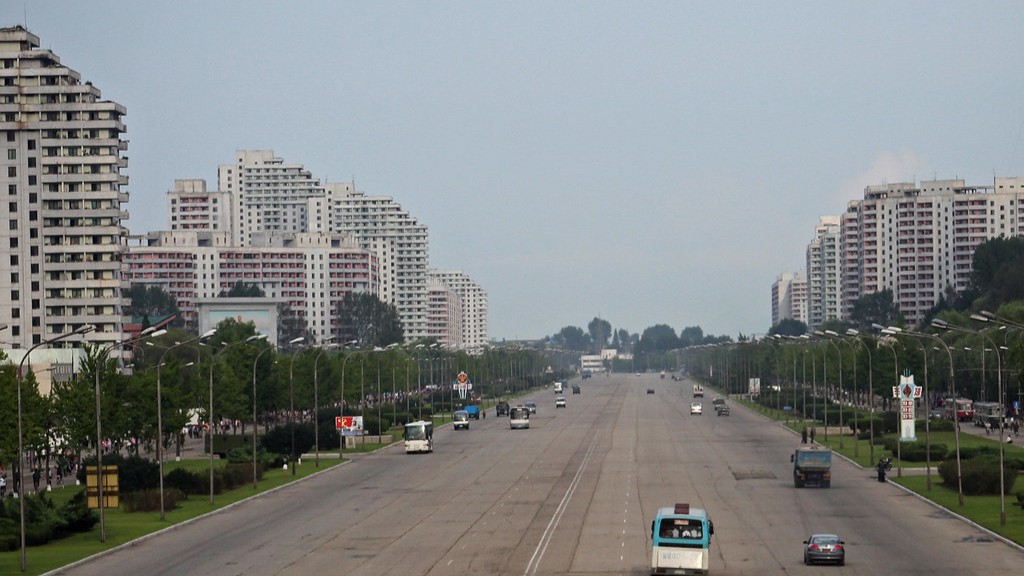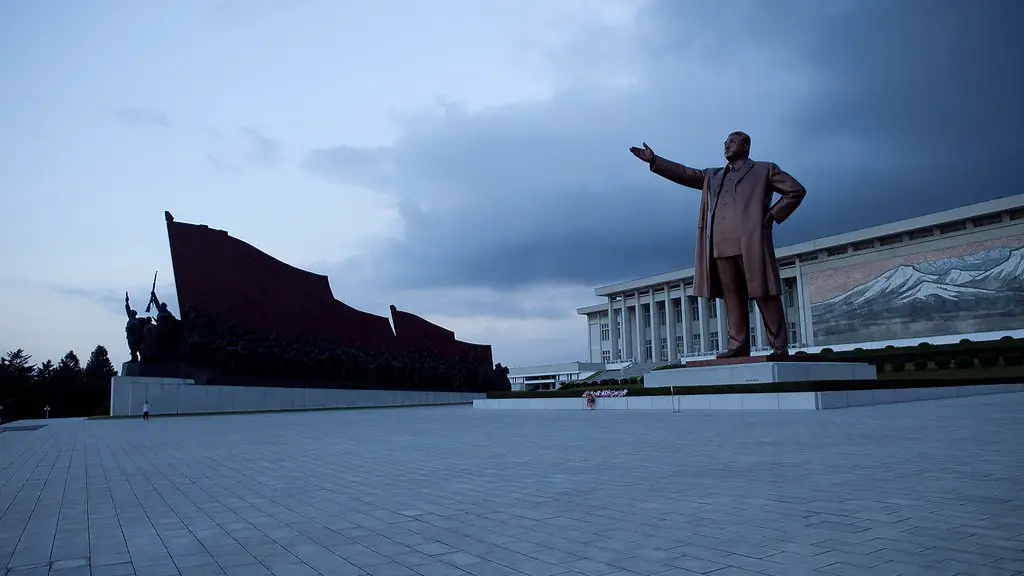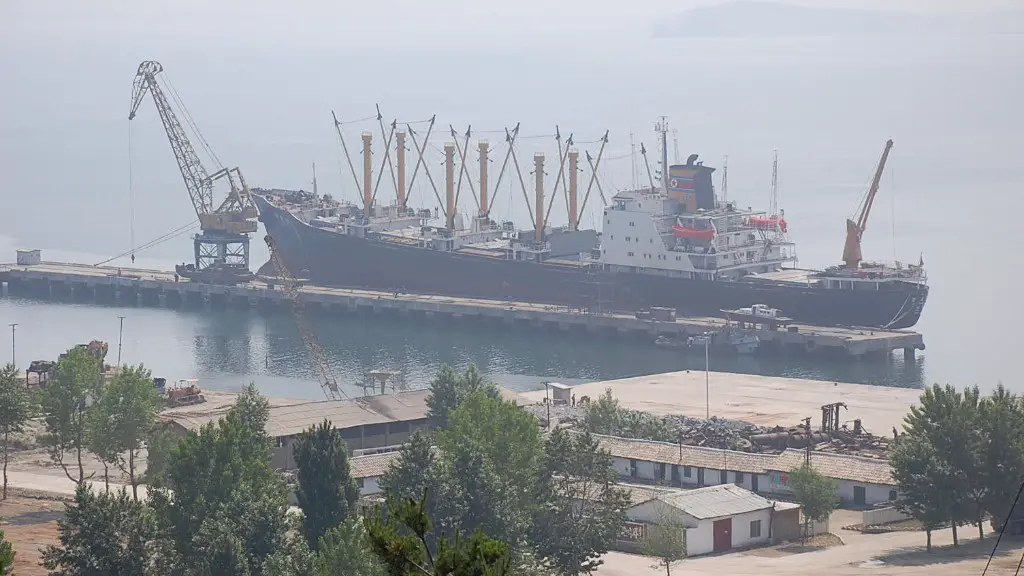North Korea’s hostile behavior towards South Korea and the US has been a source of immense distrust, fear and conflict over many years. The current situation has seen both countries threatening force against each other, with a heightened tension that could, potentially, lead to a disastrous outcome. The prospect of a North Korea led bombardment on US soil has many US citizens questioning “what if North Korea attacks first?”
There is no easy answer to this question as the outcome of such an attack would depend on many factors. However, it is important to explore the potential implications if North Korea were to launch a pre-emptive strike. In this context, some experts suggest that the effects of a North Korean assault could be wide ranging and, even, catastrophic.
At the most basic level, an unchecked North Korean attack could lead to immense civilian losses and an unprecedented threat to the security of the US. Depending on the scale and effectiveness of the initial bombarding, these casualties could be in the several thousands; with the potential for numerous deaths and long-standing psychological damage amongst survivors.
The US military are also unlikely to be spared from the effects of such an attack and, as well as casualties, would also stand to suffer material losses. This could be in the form of weaponry, equipment, munitions and bases damaged or destroyed in the assault.
On top of these casualties, the US would also face considerable economic upheaval. All these losses would come at a great cost but, arguably, the US would also stand to lose in terms of global reputation. The idea of being unable to protect its citizens from the threat of an outside force would likely cause a breakdown of trust between the US government and its people.
Analysts have also discussed the wider implications of a North Korean attack. In particular, the effect that this would have on the rest of the world and on international power dynamics. A North Korean ambush of the US would send a powerful message that, while some governments have the means and intent to retaliate, there are still some nations who are willing to resort to hostility given the right conditions.
This would threaten the stability of many countries in terms of diplomatic relations, and could even lead to a retaliation by the US or other nations. This could be a dangerous cycle of escalations that, in extreme cases, could lead to a full-blown war.
Taking all this into consideration, it is clear why a North Korean attack would prove to be a devastating event for the US and the world. While it is unlikely that Kim Jong Un would wish to initiate a preemptive strike, the possibility of a confrontation should not be ruled out entirely. As such, the US must remain vigilant and keep their defences prepared in the event of the unlikely event of a North Korean attack.
What Could US Do If Attacked
If North Korea did attempt to bomb US soil, the US would have to respond quickly and effectively. The first step would be to detect and disarm any potential threats, both on the ground or incoming missiles. This would involve mobilizing the Air Force, Navy and Army, coordinating with international allies and launching counter offensives. The US would also need to instigate appropriate defensive measures, including the moving of citizens to safe and secure locations, and the preparation of medical teams to respond to casualties.
In the wake of an attack, the US would then need to actively retaliate against North Korea. This could involve a show of force, diplomatic sanctions, or military intervention. The US may also decide to take preemptive steps to prevent any further attacks, such as stationing US forces on the North Korean border, blocking ports and conducting surveillance operations.
Finally, the US would need to use diplomatic channels to de-escalate the tensions with North Korea. This could involve entering into negotiations with North Korea, and diplomatic outreach to other countries that could act as mediators, such as China or Russia.
The US would also have to adopt a long-term strategy to ensure the safety of its citizens and any potential reoccurrences of offensive behavior from North Korea. This would involve instigating and maintaining effective military defences, strengthening diplomatic relations with North Korea and urging allies to do the same, and actively engaging with local populations in order to mitigate and prevent any possible future attacks.
US Response to Attack Factors
The US response to a North Korean attack would largely depend on the scale and extent of the attack. If it was a smaller scale incident, then the US could choose to retaliate with diplomatic pressure or economic sanctions. However, if it was a more serious assault, then the US may have to consider military intervention in order to protect its citizens and prevent any further aggression. The US would also have to take into consideration the potential response from North Korea and other international powers, as well as their own allies, before taking any decisive action.
In addition to this, the US would need to consider the potential environmental and long-term human costs of a retaliatory offensive. An attack on North Korea may bring short-term security but could also lead to a long-term humanitarian crisis, with innocent North Korean citizens affected by the conflict. This may influence the US decision to respond with armed force.
Ultimately, a North Korean attack on US soil would be an extremely serious event that would require an urgent and decisive response from the US government. The US must remain vigilant and prepared to take action if and when necessary, in order to protect their citizens from a possible attack.
International Response to Attack
The international community would react strongly to a North Korean attack on US soil. Countries such as China and Russia, both key allies of North Korea, would likely call for de-escalation and negotiations. They may even be forced to consider implementing sanctions on North Korea if the situation is not resolved peacefully.
Other countries, such as Japan and South Korea, would also be affected by a potential North Korean attack. They too would likely urge the US to refrain from retaliatory assaults, while at the same time formulating their own strategies to mitigate the effects of the incident.
In general, the international community would be shocked by such an event and would call for an immediate halt to all conflicts between North Korea and the US. This may include pressure on both countries to enter into negotiations and consider diplomatic solutions, or the introduction of sanctions depending on the particulars of the incident.
Such an attack would also be met with condemnation from the United Nations and other global organisations. They could call for an official investigation into the event, as well as demand that the perpetrators are held accountable for their actions. This could lead to various forms of international action, ranging from trade sanctions and economic boycotts to military deployment.
Risks of Ignoring Attack
One of the dangers of ignoring a North Korean attack would be to send a message to Kim Jong Un and other hostile forces that the US is unwilling to act. This could lead to further aggression by North Korea, or even another nation, and could embolden them to attempt an assault again.
The US would also have to consider the reputational risks of turning a blind eye to an attack. Ignoring a hostile force can quickly cause a breakdown in trust between government and people, and can lead to a widespread loss of faith in political and military systems.
In addition to this, the US would have to consider the long-term implications if they failed to act. This could include a destabilization in the balance of power, an increase in aggression from hostile nations, a weakening of the US’s bargaining position, and a decreased sense of safety for US citizens.
What if North Korea Uses Weapons of Mass Destruction?
If North Korea were to use weapons of mass destruction against the US, the situation would be even more serious then a conventional attack. The effects of such an assault could be far-reaching, with civilian casualties potentially in the millions and, even, the destruction of entire cities.
The US would have to respond quickly and decisively to such an event. The US military would be dispatched to the area to contain and disarm any potential threats, while international allies and the UN would be consulted to assist in the mission. The US would also have to adopt a long-term strategy in order to ensure that such an event is never repeated.
In addition to this, the US would have to prepare for any eventuality, including the possibility of a retaliatory attack from North Korea. The US would also have to take into consideration the reputational risks of not responding, as well as the potential for increased international aggression from other hostile nations.
Ultimately, the prospect of a North Korean attack would have devastating implications for the US and the world as a whole. The US must remain vigilant and prepared in the event of any potential attacks, and must ensure that they are able to respond quickly and effectively to any situation that may arise.




